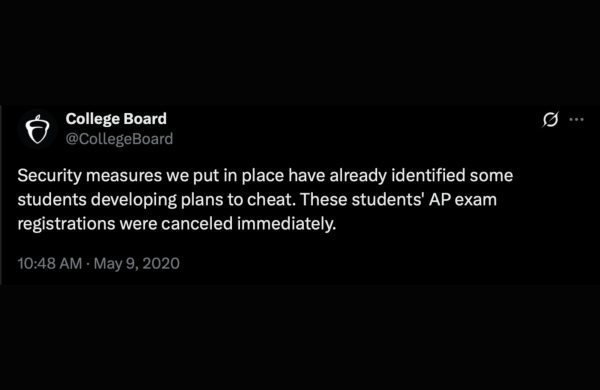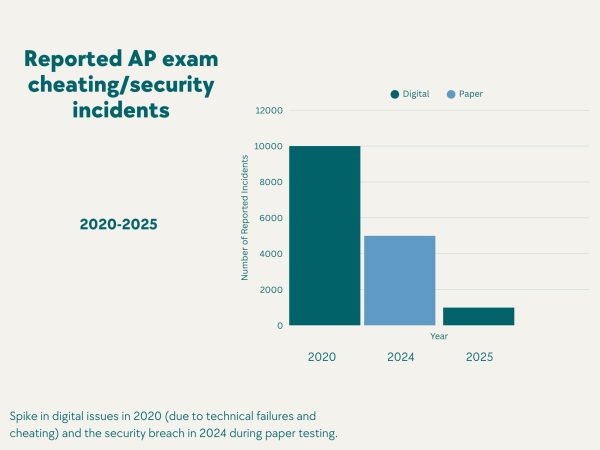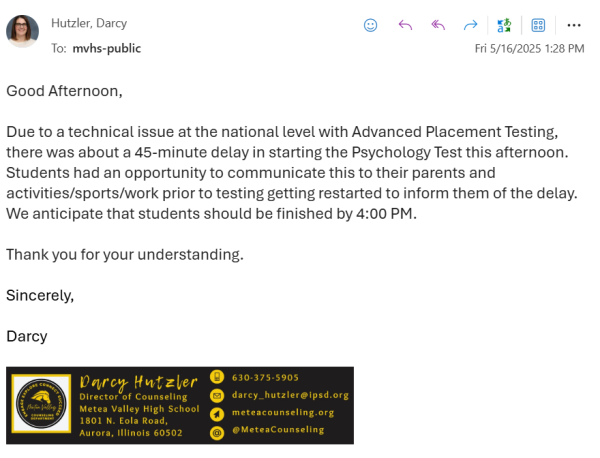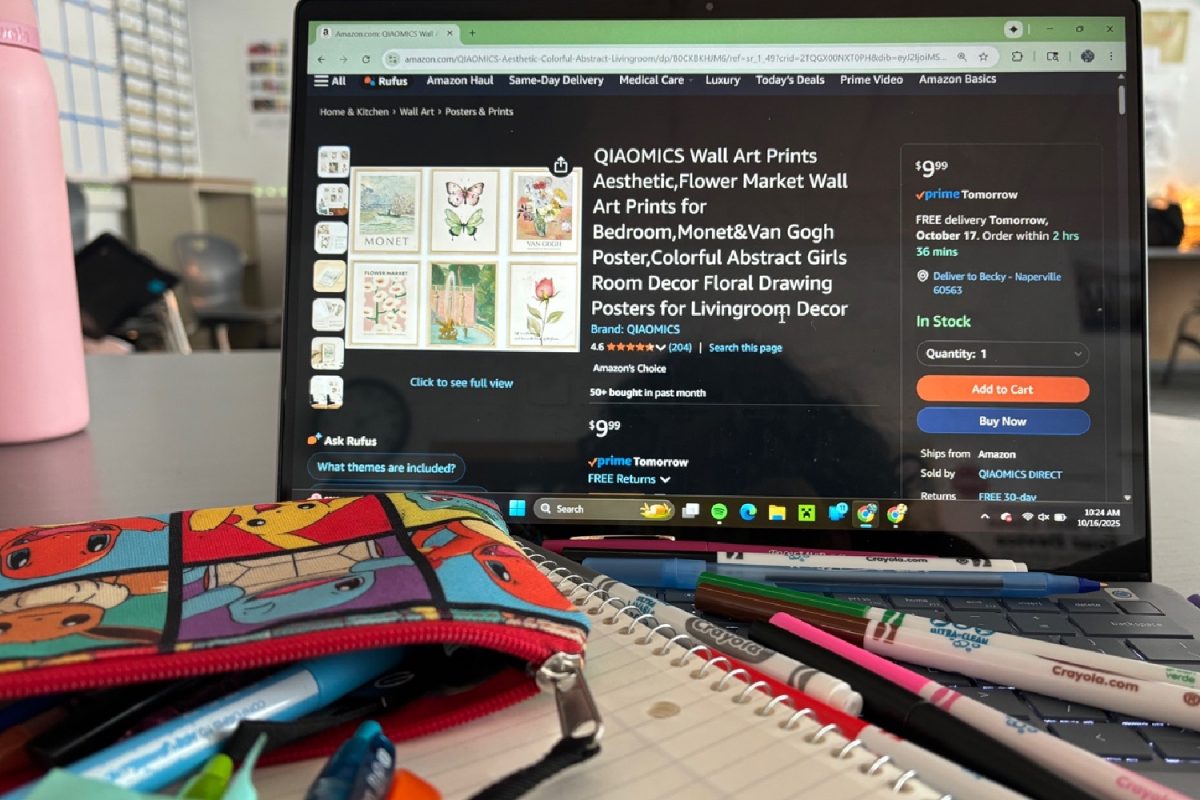It’s 7:25 a.m., you’re rushing to find your testing spot amongst a sea of other anxiety-ridden students. The proctor is frantically yelling directions at you like they’re an airport security guard screaming at you to take your shoes off. It’s a warzone. You don’t know whether or not your Chromebook was fully charged last night, or if you’re even prepared for the test. Before, you only had to worry about whether you’d retained anything from the hours of studying. Now you feel like you took the satisfaction of carefully ripping the plastic seal off the exam packet for granted.
In July 2024, the College Board officially announced that standardized paper testing for 28 of the 36 exams would be discontinued and would transition to digital testing. Students would have to sign into Bluebook to take their Advanced Placement exams, and many were outraged by this.
There have been many security and integrity concerns regarding the use of paper exams in the past. Including theft, cheating, and mailing issues when it comes to being able to access these exams. By promoting digital exams, College Board hopes of there being a significant reduction in those incidents.
There have been close calls of a large-scale exam cancellation due to test takers stealing exam material for financial gain. So in response to this, the College Board has worked towards this transition to provide improvement in the safety and integrity of the exams and students. In the past years, physical AP exams had to be printed, packaged, and shipped to thousands of schools nationwide weeks in advance. That process ultimately left lots of room for potential leaks, theft, or even black-market selling of exam materials.
In fact, according to reports from College Board officials, there were near-misses involving student groups trying to obtain and distribute test content for financial gain.

By moving AP testing onto the Bluebook app, those risks are significantly reduced. Without exams needed to be physically moved across the country, making them harder to compromise or manipulate.
In theory, going digital sounds like a win. No more test packets being shipped weeks in advance, no more smudged handwriting on FRQs, and a streamlined grading process. But not everything about this is sunshine and rainbows. The real question, though, is whether those benefits outweigh the disruptions students faced this year.

Not everything needs to be digital. First, the SAT went online, then the ACT, and now it’s all AP Exams. We’re digitizing for the sake of it. Just because we have access to advanced technology and we can put everything on a screen doesn’t mean we should. Especially not in high-stakes environments like testing, when students are already under enough pressure.
Most decisions revolving around shifting tests to the digital world are framed around the idea that it’s “modern” or “efficient,” but they’re not necessarily better for students.
Time and time again, research has shown that students generally retain information better when reading or writing on paper compared to an eye-straining screen. A 2018 meta-analysis published in Computers & Education examined 17 studies comparing digital and paper reading and found that comprehension is consistently stronger when reading on paper.
These researchers ultimately concluded that while people may read just as quickly on screens, without the possibility of going blind from the harsh blue light, they often retain less information. This is not surprising, to be honest, it’s been long understood that students retain more when reading or writing by hand.
Additionally, we have the multitasking effect. Screens encourage quick-click behavior. With an already short attention span because of TikTok and Instagram Reels, you are more likely to scroll, skim, and switch tabs, which are all habits that don’t magically disappear on testing day.
Researchers for The Journal of Experimental Psychology found that “screen-based tasks increase cognitive load.” This makes it harder for us, as students, to retain, focus, and recall information. That added mental strain is the last thing students need during a timed exam. Junior Sanjana Natarajan has experienced this firsthand.
“I couldn’t focus the same way,” Natarajan said. “My eyes hurt from staring at the screen, and I couldn’t annotate the passages like we normally do on paper.”
No matter how many times we claim that the technology we have in 2025 is efficient, it’ll never be 100%. Glitches happen. Logins will fail. And servers will continue to crash. And when they do, the fallout is complete chaos.
Take what happened last Friday, May 18, during the AP Psychology exam. Junior, Pratha Patel, was there when things went south.
“We tried to log into College Board, and it wasn’t working,” Patel said. “Everyone was confused and asking if it was working for others.”
The scene was chaotic, and people were up at the front with their Chromebooks, and even the proctors didn’t know what was going on.
The test, originally scheduled to start at noon, didn’t begin until after 1 p.m., and students were not done until nearly 4 p.m. That’s hours of uncertainty before even starting the exam.

When asked about the digital format, Patel had views similar to those of other students.
“No, absolutely not. At least with paper, you know it’s there in front of you,” she said. “You’re not waiting on a server or worried about crashes.”
While College Board says digital exams are the future, these problems seem structural…definitely not temporary.
Students shouldn’t be treated like beta testers. Having to spend valuable testing time troubleshooting tech issues is entirely preventable with proper preparation and support, exactly what College Board lacked with this transition.
Adding to the concerns, the digital format also affects students’ performance in more subtle ways. Junior Sruthilaya Muthukumar took both AP U.S. government and AP English Language exams digitally this year.
“The FRQs were less time-consuming, but it was more straining on my eyes,” Muthukumar said. “Reading the passages on the screen made it harder to focus.”
Although the typing format makes editing easier, it doesn’t change how you plan your writing and is not that much of a benefit.
“I just knew it would be easier to fix my mistakes and finish faster,” Muthukumar said.
Just because we can, does not mean we should. Technology improves and evolves all the time, and there’s no way for us to stop that. However, instead of trying to keep up, we should take a step back.
Students have more academic success when using more hands-on resources than staring at a screen for the majority of the day. Trying to find modern solutions, such as making exams like the ACT, SAT, or AP testing digital, will only cause more issues to arise.
Within the first week of exams, multiple students have had issues logging into Bluebook because of issues with their passwords or accounts. Students either couldn’t change their passwords through College Board, or it would not register in the system.
Due to this, some students were excused from their testing room, missed their exam, and were told they had to make it up another day. How convenient.
If the goal was to push out digital exams, how come nobody was prepared for these types of problems? The only thing gained from this is heightened stress and anxiety; you were waiting to be relieved after an exam you ended up not taking. This should not be happening. The distribution and planning of these exams were sloppy and miscalculated.
Many students already have personal devices, and adding more technology will only induce bad habits with an increasing screen time.
Is this what we want for our generation and generations to come? Yes, we have come far with technological developments that have brought us easier counterparts to traditional practices like paper exams, but do we want to be completely reliant on technology? No, there is a divide in education between wanting to be completely digital and wanting to not change what has worked for ages.
This is not the argument of whether we should keep technology in classrooms; it’s about not wanting it to be shoved in our faces where our scores matter most. Students perform better on standardized testing when done on paper; it’s a fact.
According to Common Sense Classical, pencil and paper methods are proven to increase memory function. As mentioned earlier, physically writing down on paper helps you retain information. This push toward primarily taking exams online is inconsiderate toward students and aids in poor performance.
Moving forward, instead of making us the “guinea pigs” of this new shift to digital exams, we should be easing into it to ensure a smoother transition. 12 of the 28 digital exams are hybrid, meaning the questions will be displayed on Bluebook, but you can answer on the exam packet. This should be the standard for all digital exams since the shift is inevitable; that way, it can be easier for students to adapt and ensure that another incident similar to the AP Psych exam won’t happen again.
Ultimately, the main priority should be students’ success, it’s what we all want. So, for the future, College Board should take this year’s exams into consideration and figure out ways to improve their system. Not Bluebook, but the way that this new change in exam taking has been handled. We want to ensure that this will not affect our performance and scores.
Next year, do better, College Board.













